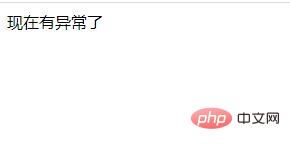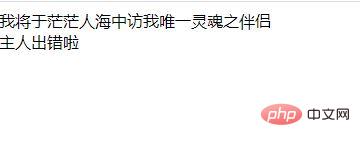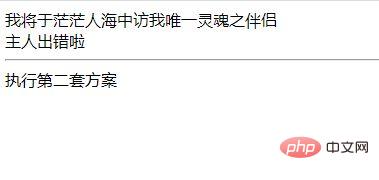 Backend Development
Backend Development
 PHP Problem
PHP Problem
 What is a custom exception handling class in PHP? How to solve custom exception handling class?
What is a custom exception handling class in PHP? How to solve custom exception handling class?
What is a custom exception handling class in PHP? How to solve custom exception handling class?
The previous article introduced you to "What is exception handling in PHP? How to use try-catch in exception handling? 》, this article continues to introduce to you what is a custom exception handling class in PHP? How can we solve custom exception handling class? It has certain reference value. Friends in need can refer to it. I hope it will be helpful to everyone.

Custom exception handling class:
final:If used to modify the class, then it represents this The class cannot be inherited. If it is used to modify a method, it means that this method cannot be overridden.
To inherit from the official exception handling class, the method can be added by yourself. Pay attention to whether the parent class method can be overridden.
[Note] If there are multiple catches, write the custom exception class above and the official exception class below
Nesting: You can create a try in try
Custom exception handling function (understand)
set_exception_ handler('test') ;
Register a function. When an exception is thrown, it will be automatically caught by this function. , = This function has one parameter, and the parameter is the exception object
Let’s take the code as an example:
<?php
function test($e)
{
echo $e->getMessage();
}
set_exception_handler('test');
throw new Exception( '现在有异常了');
Regarding the exception handling class, we still use the code Let me explain the form to you. First, we still need to create a new file. We define a class. We need to inherit the official exception handling class. Then we define a (function) method in the class. Suppose we try to execute the code through try. At that time, we can catch it through our own exception handling class. We demonstrate it through the code as follows:
<?php
class MyException extends Exception
{
function demo( )
{
echo '执行第二套方案<br />' ;
}
}
try {
echo '我将于茫茫人海中访我唯一灵魂之伴侣<br />';
throw new MyException( '主人出错啦');
echo '得之,我幸;不得,我命<br />';
} catch (MyException $e) {
echo $e->getMessage();
}
?>The code demonstration result is as follows:

The following is our own defined exception handling class. If there is an error in execution, we can execute the second set of methods.
catch (MyException $e) {
echo $e->getMessage();
echo '<hr>';
$e->demo();
}The code demonstration results are as follows:

This is the exception handling class we defined ourselves;
Let’s copy the code just now, and let’s find out which catch can catch the exception. The code is as follows:
try {
echo '我将于茫茫人海中访我唯一灵魂之伴侣<br />';
throw new MyException( '主人出错啦');
echo '得之,我幸;不得,我命<br />';
} catch (MyException $e) {
echo '因为爱过,所以慈悲';
}catch (Exception $e){
echo '因为懂得,所以宽容';
}The code demonstration results are as follows:

It can be seen from the code that the exception captured is our custom exception handling class to capture this object. If we combine MyException and Exception What would happen if the order was changed? When we run it, we will find that it is still the first one,
Note: Exception is an official class, it is a parent class, it is a parent class of MyException, if they are both at the same time When catching exceptions, we need to put the subclass first, and then write the official class.
Recommended learning: php video tutorial
The above is the detailed content of What is a custom exception handling class in PHP? How to solve custom exception handling class?. For more information, please follow other related articles on the PHP Chinese website!

Hot AI Tools

Undresser.AI Undress
AI-powered app for creating realistic nude photos

AI Clothes Remover
Online AI tool for removing clothes from photos.

Undress AI Tool
Undress images for free

Clothoff.io
AI clothes remover

AI Hentai Generator
Generate AI Hentai for free.

Hot Article

Hot Tools

Notepad++7.3.1
Easy-to-use and free code editor

SublimeText3 Chinese version
Chinese version, very easy to use

Zend Studio 13.0.1
Powerful PHP integrated development environment

Dreamweaver CS6
Visual web development tools

SublimeText3 Mac version
God-level code editing software (SublimeText3)

Hot Topics
 1377
1377
 52
52
 PHP 8.4 Installation and Upgrade guide for Ubuntu and Debian
Dec 24, 2024 pm 04:42 PM
PHP 8.4 Installation and Upgrade guide for Ubuntu and Debian
Dec 24, 2024 pm 04:42 PM
PHP 8.4 brings several new features, security improvements, and performance improvements with healthy amounts of feature deprecations and removals. This guide explains how to install PHP 8.4 or upgrade to PHP 8.4 on Ubuntu, Debian, or their derivati
 Discuss CakePHP
Sep 10, 2024 pm 05:28 PM
Discuss CakePHP
Sep 10, 2024 pm 05:28 PM
CakePHP is an open-source framework for PHP. It is intended to make developing, deploying and maintaining applications much easier. CakePHP is based on a MVC-like architecture that is both powerful and easy to grasp. Models, Views, and Controllers gu
 CakePHP File upload
Sep 10, 2024 pm 05:27 PM
CakePHP File upload
Sep 10, 2024 pm 05:27 PM
To work on file upload we are going to use the form helper. Here, is an example for file upload.
 How To Set Up Visual Studio Code (VS Code) for PHP Development
Dec 20, 2024 am 11:31 AM
How To Set Up Visual Studio Code (VS Code) for PHP Development
Dec 20, 2024 am 11:31 AM
Visual Studio Code, also known as VS Code, is a free source code editor — or integrated development environment (IDE) — available for all major operating systems. With a large collection of extensions for many programming languages, VS Code can be c
 How do you parse and process HTML/XML in PHP?
Feb 07, 2025 am 11:57 AM
How do you parse and process HTML/XML in PHP?
Feb 07, 2025 am 11:57 AM
This tutorial demonstrates how to efficiently process XML documents using PHP. XML (eXtensible Markup Language) is a versatile text-based markup language designed for both human readability and machine parsing. It's commonly used for data storage an
 CakePHP Quick Guide
Sep 10, 2024 pm 05:27 PM
CakePHP Quick Guide
Sep 10, 2024 pm 05:27 PM
CakePHP is an open source MVC framework. It makes developing, deploying and maintaining applications much easier. CakePHP has a number of libraries to reduce the overload of most common tasks.
 PHP Program to Count Vowels in a String
Feb 07, 2025 pm 12:12 PM
PHP Program to Count Vowels in a String
Feb 07, 2025 pm 12:12 PM
A string is a sequence of characters, including letters, numbers, and symbols. This tutorial will learn how to calculate the number of vowels in a given string in PHP using different methods. The vowels in English are a, e, i, o, u, and they can be uppercase or lowercase. What is a vowel? Vowels are alphabetic characters that represent a specific pronunciation. There are five vowels in English, including uppercase and lowercase: a, e, i, o, u Example 1 Input: String = "Tutorialspoint" Output: 6 explain The vowels in the string "Tutorialspoint" are u, o, i, a, o, i. There are 6 yuan in total
 Explain JSON Web Tokens (JWT) and their use case in PHP APIs.
Apr 05, 2025 am 12:04 AM
Explain JSON Web Tokens (JWT) and their use case in PHP APIs.
Apr 05, 2025 am 12:04 AM
JWT is an open standard based on JSON, used to securely transmit information between parties, mainly for identity authentication and information exchange. 1. JWT consists of three parts: Header, Payload and Signature. 2. The working principle of JWT includes three steps: generating JWT, verifying JWT and parsing Payload. 3. When using JWT for authentication in PHP, JWT can be generated and verified, and user role and permission information can be included in advanced usage. 4. Common errors include signature verification failure, token expiration, and payload oversized. Debugging skills include using debugging tools and logging. 5. Performance optimization and best practices include using appropriate signature algorithms, setting validity periods reasonably,



